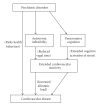Cardiovascular disease and psychiatric comorbidity: the potential role of perseverative cognition
- PMID: 20029626
- PMCID: PMC2790803
- DOI: 10.1155/2009/791017
Cardiovascular disease and psychiatric comorbidity: the potential role of perseverative cognition
Abstract
The high comorbidity between psychiatric disorders and cardiovascular disease has received increasing attention, yet little is known about the processes linking the two. One plausible contributing mechanism is the tendency of those with psychiatric disorders to ruminate on stressful events. This phenomenon, sometimes called perseverative cognition, can extend the psychological and physiological effects of stress, which could contribute to cardiovascular disease etiology. In this paper, we discuss the potential role of perseverative cognition in mediating the relationship between psychiatric illness and cardiovascular disease. Rumination can delay physiological recovery from acute stress, which in turn has been found to predict future cardiovascular health. This delayed recovery could act as a mechanism in the longitudinal link between worry and cardiovascular health. The cognitive inflexibility that characterizes mood and anxiety disorders may then contribute to disease not by producing greater reactivity, but instead through extending activation, increasing the risks for cardiovascular damage.
Figures

Similar articles
-
The perseverative cognition hypothesis: a review of worry, prolonged stress-related physiological activation, and health.J Psychosom Res. 2006 Feb;60(2):113-24. doi: 10.1016/j.jpsychores.2005.06.074. J Psychosom Res. 2006. PMID: 16439263 Review.
-
Conscious and unconscious perseverative cognition: is a large part of prolonged physiological activity due to unconscious stress?J Psychosom Res. 2010 Oct;69(4):407-16. doi: 10.1016/j.jpsychores.2010.02.002. Epub 2010 Apr 8. J Psychosom Res. 2010. PMID: 20846542 Review.
-
Expanding stress theory: prolonged activation and perseverative cognition.Psychoneuroendocrinology. 2005 Nov;30(10):1043-9. doi: 10.1016/j.psyneuen.2005.04.008. Psychoneuroendocrinology. 2005. PMID: 15939546 Review.
-
Effects of explicit and implicit perseverative cognition on cardiac recovery after cognitive stress.Int J Psychophysiol. 2009 Dec;74(3):220-8. doi: 10.1016/j.ijpsycho.2009.09.003. Epub 2009 Sep 19. Int J Psychophysiol. 2009. PMID: 19770006
-
Resting Heart Rate Variability, Facets of Rumination and Trait Anxiety: Implications for the Perseverative Cognition Hypothesis.Front Hum Neurosci. 2017 Oct 31;11:520. doi: 10.3389/fnhum.2017.00520. eCollection 2017. Front Hum Neurosci. 2017. PMID: 29163100 Free PMC article.
Cited by
-
Cardiovascular Profile of Valbenazine: Analysis of Pooled Data from Three Randomized, Double-Blind, Placebo-Controlled Trials.Drug Saf. 2018 Apr;41(4):429-440. doi: 10.1007/s40264-017-0623-1. Drug Saf. 2018. PMID: 29218680 Free PMC article.
-
Mental health treatment and its impact on survival outcomes in patients with comorbid mental health and cardiovascular diseases: a retrospective cohort study.BMC Psychiatry. 2025 Jul 1;25(1):609. doi: 10.1186/s12888-025-07035-4. BMC Psychiatry. 2025. PMID: 40597905 Free PMC article.
-
Amygdala functional connectivity as a longitudinal biomarker of symptom changes in generalized anxiety.Soc Cogn Affect Neurosci. 2016 Nov;11(11):1719-1728. doi: 10.1093/scan/nsw091. Epub 2016 Jun 30. Soc Cogn Affect Neurosci. 2016. PMID: 27369066 Free PMC article.
-
Mindfulness Meditation Targets Transdiagnostic Symptoms Implicated in Stress-Related Disorders: Understanding Relationships between Changes in Mindfulness, Sleep Quality, and Physical Symptoms.Evid Based Complement Alternat Med. 2018 May 13;2018:4505191. doi: 10.1155/2018/4505191. eCollection 2018. Evid Based Complement Alternat Med. 2018. PMID: 29861769 Free PMC article.
-
Fourth revolution in psychiatry - Addressing comorbidity with chronic physical disorders.Indian J Psychiatry. 2010 Jul;52(3):213-9. doi: 10.4103/0019-5545.70973. Indian J Psychiatry. 2010. PMID: 21180405 Free PMC article.
References
-
- Evans DL, Charney DS. Mood disorders and medical illness: a major public health problem. Biological Psychiatry. 2003;54(3):177–180. - PubMed
-
- Musselman DL, Evans DL, Nemeroff CB. The relationship of depression to cardiovascular disease: epidemiology, biology, and treatment. Archives of General Psychiatry. 1998;55(7):580–592. - PubMed
-
- Rozanski A, Blumenthal JA, Kaplan J. Impact of psychological factors on the pathogenesis of cardiovascular disease and implications for therapy. Circulation. 1999;99(16):2192–2217. - PubMed
-
- Hayward C. Psychiatric illness and cardiovascular disease risk. Epidemiologic Reviews. 1995;17(1):129–138. - PubMed
-
- Barefoot JC, Schroll M. Symptoms of depression, acute myocardial infarction, and total mortality in a community sample. Circulation. 1996;93(11):1976–1980. - PubMed
LinkOut - more resources
Full Text Sources
